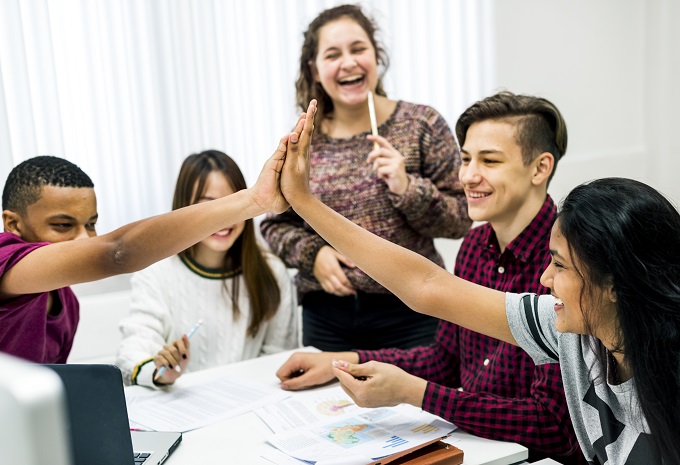
Rawpixel.com via Adobe stock
<p>This is the key question that we must ask when incorporating sustainability in education and it Shay Wright presented it to attendees at last year’s <em>uLearn Conference</em>.</p>
<p>He asked a large audience of teachers, principals and educators to reflect for themselves and their learners: ‘I ahu mai au i hea?’, ‘Where do we come from?’ New Zealand’s history and culture shapes our identity, he said, but how many of us grew up learning everything but our history? “I’m so stoked to hear we will be teaching NZ history in our schools.” He prompted everyone to carefully and critically consider how they might ‘become better ancestors’ and brainstorm what that might mean for learners and the wider curriculum.</p>
<p>It particularly resonates as we think about education for sustainability and discuss ways to incorporate sustainability into our student learning pathways. How can we, as community members, local caretakers and global citizens become a force for environmental protection and safeguarding? What are the social, political, scientific, and corporate ramifications?</p>
<p>Shay emphasised the importance of helping students build stronger links to the places they are from. Environmental stewardship, he warned, is a powerful tool for connectedness. He said that as citizens we increasingly live in a world where people are not connected to place; where our connection to nature becomes a ‘once a year’ holiday rather than a way of life. He criticised adults who have mocked Greta Thunberg, holding them up as examples of what not to do as a teacher.</p>
<p>Facilitators of learning should ask learners questions that might provoke them to think more deeply about global issues, rather than crush their interest. Similarly, projects that centre around sustainability should be inquiry-based; not prescriptive dead-ends that stifle problem-solving. When we view teaching sustainability as building connection between learners and place, the role of the teacher-facilitator is to engage students in their communities. How can they build a practice of responsibility and action for the sustainable future?</p>
<p>This is also how the New Zealand Curriculum advocates we teach sustainability.</p>
<blockquote>
<p><em>“Mō tātou te taiao ko te atawhai, mō tātou te taiao ko te orange.”</em></p>
<p><em> “It is for us to care for and look after the environment to ensure its wellbeing, in doing so we ensure our own wellbeing and that of our future generations.”</em></p>
</blockquote>
<p>In<em> Educating for Sustainability in Primary Schools: Teaching for the Future</em>, Neil Taylor, Frances Quinn, Chris Eames reflect on this statement as it pertains to teaching sustainability in primary schools.</p>
<p>They write: “There is also increasing recognition that consideration of environmental issues requires us to see how cultural norms, economic need for resources, and political decision-making connect human societies to the environment. Thus, we are now acknowledging that the environment is shaped by our cultures: our consumption habits, how we make our living, enjoy recreation, govern ourselves and consider the future.”</p>
<p>Culture is a huge factor in how we relate to our environment. Advocates for an educational shift towards local histories, local stories and the integration of local heritage into our public schools argue that building local bonds between learners and their community benefits both.</p>
<p>As Shay said:</p>
<blockquote>
<p>I never learned about my own tribal history or the local context of our school even though my school was 60 percent Māori. I encourage local community members to come in and tell local stories; to build bonds between students and place so that they can feel responsible for their place.</p>
</blockquote>
<p>In many ways, it is this responsibility for <em>place</em> that sustainability in education truly aims to teach. In that sense, true sustainability for education is so much more than learning about global warming, the woes of single-use plastic, or even refining systems for waste and recycling.</p>
<p>These issues and learning goals are still critical to sustainable study, but sustainable extends far beyond. This may uplift anyone who is fearful about the impact of COVID on sustainability, i.e. the resurgence of single-use plastic.</p>
<p>Sustainable schools tackle water conservation projects, team up with community action groups, join plant and animal conservation efforts, participate in environmental protests, develop new recycling and waste management strategies, and more. Sustainability is about problem-solving, which is more vital than ever in this COVID world.</p>
<p>We spoke with a group of primary school students who were working on a STEM project developing smart bins to encourage better recycling at their school, who said they developed the idea after watching their friends throw rubbish in the general bin because they weren&#8217;t sure which recycling bin was suitable and became frustrated.</p>
<p>They solved a problem they spotted in their community, just like our world leaders have had to do during COVID.</p>
<p>However, integrating sustainability for education in 2021 requires more of what Taylor, Quinn and Eames discuss in their book. It requires collaborative learning about “how cultural norms, economic need for resources, and political decision-making connect human societies to the environment”.</p>
<p>How can we grow food sustainably? How can we evolve sustainable industries to maintain economic growth? These are questions that your learners’ sustainability projects can tackle and that will ultimately prepare them to solve the biggest problems facing our world.</p>
<p> ;</p>
<p> ;</p>

Professional learning and development (PLD) for teachers needs to be higher impact for teachers and…
Students displayed increasing AI literacy when explicitly asked to engage with the technology for their…
A new Government collective offer will be voted on by members of NZEI Te Riu…
New Zealand’s education system is a canvas of opportunity to inspire and empower every child.…
When done well, a wellbeing challenge can build habits that support wellbeing for life—and lays…
Te Akatea Inc., the National Māori Principals’ Association has released a discussion paper reflecting on…
This website uses cookies.